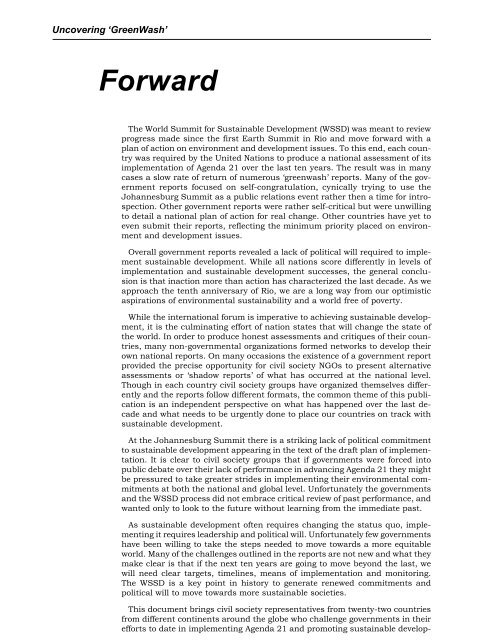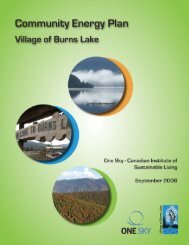Danish
Uncovering Greenwash: Challenging our governments ... - One Sky
Uncovering Greenwash: Challenging our governments ... - One Sky
- No tags were found...
Create successful ePaper yourself
Turn your PDF publications into a flip-book with our unique Google optimized e-Paper software.
Uncovering ‘GreenWash’<br />
Forward<br />
The World Summit for Sustainable Development (WSSD) was meant to review<br />
progress made since the first Earth Summit in Rio and move forward with a<br />
plan of action on environment and development issues. To this end, each country<br />
was required by the United Nations to produce a national assessment of its<br />
implementation of Agenda 21 over the last ten years. The result was in many<br />
cases a slow rate of return of numerous ‘greenwash’ reports. Many of the government<br />
reports focused on self-congratulation, cynically trying to use the<br />
Johannesburg Summit as a public relations event rather then a time for introspection.<br />
Other government reports were rather self-critical but were unwilling<br />
to detail a national plan of action for real change. Other countries have yet to<br />
even submit their reports, reflecting the minimum priority placed on environment<br />
and development issues.<br />
Overall government reports revealed a lack of political will required to implement<br />
sustainable development. While all nations score differently in levels of<br />
implementation and sustainable development successes, the general conclusion<br />
is that inaction more than action has characterized the last decade. As we<br />
approach the tenth anniversary of Rio, we are a long way from our optimistic<br />
aspirations of environmental sustainability and a world free of poverty.<br />
While the international forum is imperative to achieving sustainable development,<br />
it is the culminating effort of nation states that will change the state of<br />
the world. In order to produce honest assessments and critiques of their countries,<br />
many non-governmental organizations formed networks to develop their<br />
own national reports. On many occasions the existence of a government report<br />
provided the precise opportunity for civil society NGOs to present alternative<br />
assessments or ‘shadow reports’ of what has occurred at the national level.<br />
Though in each country civil society groups have organized themselves differently<br />
and the reports follow different formats, the common theme of this publication<br />
is an independent perspective on what has happened over the last decade<br />
and what needs to be urgently done to place our countries on track with<br />
sustainable development.<br />
At the Johannesburg Summit there is a striking lack of political commitment<br />
to sustainable development appearing in the text of the draft plan of implementation.<br />
It is clear to civil society groups that if governments were forced into<br />
public debate over their lack of performance in advancing Agenda 21 they might<br />
be pressured to take greater strides in implementing their environmental commitments<br />
at both the national and global level. Unfortunately the governments<br />
and the WSSD process did not embrace critical review of past performance, and<br />
wanted only to look to the future without learning from the immediate past.<br />
As sustainable development often requires changing the status quo, implementing<br />
it requires leadership and political will. Unfortunately few governments<br />
have been willing to take the steps needed to move towards a more equitable<br />
world. Many of the challenges outlined in the reports are not new and what they<br />
make clear is that if the next ten years are going to move beyond the last, we<br />
will need clear targets, timelines, means of implementation and monitoring.<br />
The WSSD is a key point in history to generate renewed commitments and<br />
political will to move towards more sustainable societies.<br />
This document brings civil society representatives from twenty-two countries<br />
from different continents around the globe who challenge governments in their<br />
efforts to date in implementing Agenda 21 and promoting sustainable develop-



